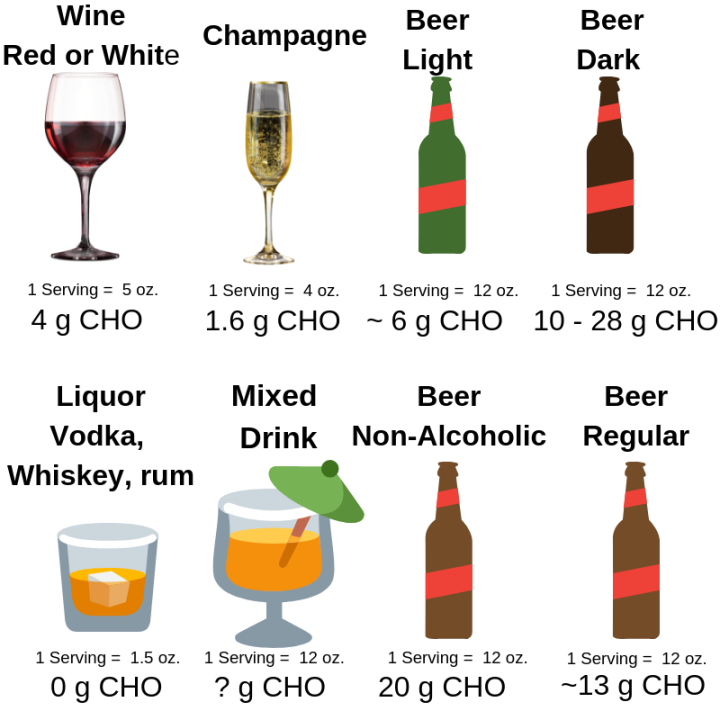
Updated April 12, 2021
As a type 1 diabetic who loves a good IPA, I often get asked how alcohol affects blood glucose. The answer I give is not what most would expect.
If you’re still confused after reading this post or want to know more, check out the sources I have linked at the end of the page.
Alcohol does not equal Carbohydrates
Most people lump alcohol in with carbohydrates. They expect alcohol itself to act as sugar and raise blood glucose levels, but a shot of vodka is not a cookie, and beer is not quite “liquid bread”. Although many popular alcoholic beverages contain carbohydrates and may raise blood sugars, alcohol itself is not a carbohydrate. While alcohol is produced from carbohydrates, yeast convert sugar into ethyl alcohol (ethanol) and CO2 through a process called fermentation. Neither of these fermentation products are carbohydrates and therefore neither is metabolized by the body as a carbohydrate.
Alcohol is a completely different nutrient, although use of the word nutrient is controversial. Alcohol provides energy (7 kilocalories/gram); however, it performs no essential functions in the body. Basically we can get energy from it, but we don’t need it to function as we need fat, carbohydrates, and protein.
Takeaway: Your body doesn’t recognize the alcohol in your drink as carbohydrate molecules, so it sends it to a different location and down a different metabolic pathway.
How then is Alcohol broken down?
Alcohol primarily gets broken down in the liver (although some of it may be metabolized in the stomach- known as first-pass metabolism). Our bodies cannot store alcohol in its original form (like it can other nutrients), so it works very hard to rid itself of both the ethanol and the toxic intermediate of alcohol metabolism, acetaldehyde (contributor to the dreaded hangover). There a number of pathways (at least 3 that we are aware of), but the primary pathway involves the two enzymes alcohol dehydrogenase and acetaldehyde dehydrogenase.
Alcohol breakdown takes priority over the breakdown of carbohydrates, protein, and fat. Liver cells detoxify alcohol, and one of the end products acetate may be converted to Acetyl CoA and used to synthesize fatty acids, which are then assembled into fats for storage and/or utilization.

Alcohol and Blood Sugar
The effect of alcohol on blood sugar is complicated.
We’ve learned that alcohol differs from carbohydrates and so does not in itself cause blood glucose to spike. We’ve also mentioned that alcohol breakdown takes priority over the breakdown of other nutrients. Another thing to add is that heavy drinking suppresses gluconeogenesis (GNG), which is the body’s process of synthesizing glucose in the liver to maintain blood glucose levels and avoid dangerous hypoglycemia. The steps in the primary alcohol metabolism pathway produce two NADH molecules. This results in a decrease in the NAD+/NADH ratio, which can inhibit the production of pyruvate from lactate (a substrate for gluconeogenesis) and may lead to accumulation of lactate.
This means that people with diabetes should be wary, as blood sugar levels may fall depending largely on the type of alcoholic beverage consumed, activity level, insulin on board, and when food was last consumed. It can become difficult to raise your blood sugar as you ingest more alcohol. Because your body focuses on breaking down alcohol over other nutrients, you may be more likely to become hypoglycemic if you drink on an empty stomach or post workout.
This is not to say that consuming an alcoholic beverage will always result in lower blood sugars. Hyperglycemia (High blood sugar) may also be a risk, as many alcoholic drinks contain carbohydrates that you may need to account for.
General Tips to Safe Drinking for the Type 1 Diabetic
That being said, there are a few ways to drink responsibly as a diabetic, and minimize the risks associated with alcoholic consumption.
- Make sure to check blood sugar before beginning to drink
- Don’t drink on an empty stomach
- Never drink alcohol when your blood sugar is low
- Always carry glucose
- Always know what it is you are drinking (Grabbing a drink from a bathtub full of “Jungle Juice” may not be the best idea)
- Drink in moderation
- Don’t drink pre or during a workout
- Inform friends that you have diabetes
What if you’re not Diabetic? Is hypoglycemia still a risk?
Although extremely rare, hypoglycemia may still be a risk, even if you are not living with diabetes. It is possible for people without diabetes to become hypoglycemic if they drink excessively without having eaten for days or if they were to conduct extreme exercise under the influence.
Generally the advice is the same: be smart, be safe, and enjoy that IPA!

For More on Alcohol Metabolism and Blood Glucose:
Cederbaum AI. Alcohol metabolism. Clin Liver Dis. 2012;16(4):667-85.
Steiner JL, Crowell KT, Lang CH. Impact of Alcohol on Glycemic Control and Insulin Action. Biomolecules. 2015;5(4):2223-46. Published 2015 Sep 29. doi:10.3390/biom5042223
Tetzschner R, Nørgaard K, Ranjan A. Effects of alcohol on plasma glucose and prevention of alcohol‐induced hypoglycemia in type 1 diabetes—A systematic review with GRADE. Diabetes Metab Res Rev. 2018;34:e2965. https://doi.org/10.1002/dmrr.2965


What a beautifully written, informative piece that captures the issues you raise effectively. Good work!
LikeLike
Yes. I am 54 and just diagnosed type 1 a few months ago. Have been reading voraciously about type1. This the first thing I have read about type 1 and alcohol that really made the dynanamics clear to me. Thank you!
LikeLike
I am so glad you have found it helpful! Please feel free to reach out with any further questions you may have. I was diagnosed when I was two years old, but I can understand how challenging/complicated it may be.
LikeLike